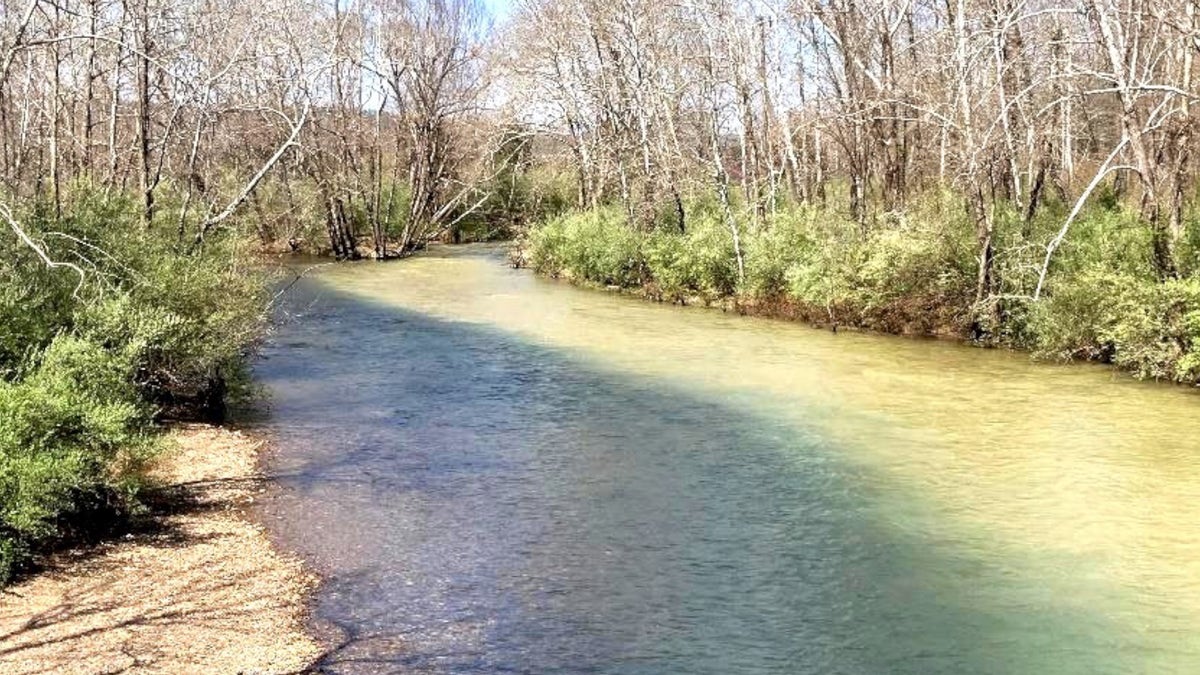Residents clash with Boy Scouts, call on them to protect dying river: locals
Virginia residents are calling on the National Capital Area Council of the Boy Scouts of America to protect the Maury River after draining the lake and leading sediment downstream.
A Boy Scouts camp is facing a community of upset Virginians for flooding a scenic river with sediment, coloring it a cloudy brown and driving away anglers, kayakers and swimmers, two locals described to Fox News Digital.
Every fall, the National Capital Area Council of the Boy Scouts drains Lake Merriweather, causing sediment to flow into the Maury River in west-central Virginia. The area has become a popular attraction for hikers, kayakers, fishers and swimmers in the summer, but last August, the scouts drained the lake early — during peak season — as it prepared for a dredging project, bringing residents' frustrations to a head, the locals said.
"We're heartbroken that the river turned dirty during the summer when people spend their time on the river banks," said John Pancake, who has spent every summer on the Maury and has lived along it for 12 years. "It's a thing that people love here, and so having it kind of wrecked was a really sad thing for people here."
Lake Merriweather must be occasionally drained in order to maintain its dam or risk a flood that could destroy thousands of people's properties downstream, the Boy Scouts council's director of support services, Matthew Keck, told The Washington Post. As a result, sediment collected in the lake is released into the Maury, damaging its water quality.

John Pancake, a lifelong Virginian living along the Maury River, has watched the sediment flooding downstream change the scenic state river. He spent every summer on the river before moving there full-time 12 years ago. (Fox News Digital / Courtesy: John Pancake)
Less than a mile downstream from Lake Merriweather, the Little Calfpasture and the Calfpasture rivers merge to form the iconic Maury, which the General Assembly of Virginia designated a "state scenic river" in 2020. The Maury flows 43 miles through Rockbridge County, Virginia, where many of Pancake's family members have lived since the 1700s.
The lake draining has gone on for years, Pancake told Fox News Digital, but when Goshen Pass — a popular part of the Maury outside his house — turned brown during the summer, the situation became untenable. The sediment drove locals and tourists away from enjoying activities on the river during the area's busy season, he said.
"People were really upset," Pancake said. "It was just a field of clean rocks, and now there's soil that's built up in the rocks and vegetation."
The National Capital Area Council of the Scouts had drained the lake in preparation for a dredging project through a federal grant that ultimately failed to come together, according to Keck. Consequently, mud flats were exposed for weeks, sending sediment into the Maury, he said.
Pancake is part of the Maury River Alliance, a local advocacy group that formed last summer in response to concerns about the sediment pouring into the river. By April, at least 150 people attended a meeting with the group at a fire station, The Washington Post reported.
"I've been on this river for all my life, more than 70 years, and the sediment has changed the river," Pancake said. "The sediment can smother the little critters that are at the bottom of the feed chain and kind of smother the life out of the river."

Some Virginia locals along the Maury River are concerned about sediment flooding into the waterway. (Courtesy: Dr. Robert Brent of James Madison University)
The increased sediment downstream has been an ongoing concern since the 1990s, but between May 2022 and 2023, the sediment from Lake Merriweather exceeded what is needed to keep healthy aquatic life, according to a James Madison University study published last year. It also found that sediment loads in the Maury were six times higher in the winter compared to the summer because of the lake drainings.
"It's very sad," Linda Larsen, who has rented a property along the Maury for over 30 years, told Fox News Digital. "There just aren't the variety of fish that there had been there. There aren't the variety of birds that there had been."
Larsen, another member of the Maury River Alliance, said wildlife is getting "choked out" of their homes from the sediment.
"There is now this blanket of sediment that is covering the riverbed," Larsen said. "So, all of these animals, these very small little insects and animals that are necessary for the life and eco-cycle of the river, are being killed."
In 1992, the Virginia Department of Environmental Quality said sediment caused by the Scouts' dam management caused a fish kill in the Little Calfpasture, The Washington Post reported. The state, as a result, required the council to change its management practices, but those sanctions were lifted in 2014 when it was determined that the river was gradually improving.

Locals are calling on a Boy Scouts council to protect a scenic waterway after the group drained a lake, allowing sediment to pour into the Maury River last summer. (Justin Sullivan/Getty Images)
Larsen blamed the National Capital Area Council of the Scouts for the river's decline.
"It has nothing to do with the children. It has nothing to do with the national organization," Larsen told Fox News Digital. "It has to do only with the council that owns the property that is allowing this pollution to continue to occur on the Maury River."
"The owners and operators of the camp have not treated the river as they should," she said. "I think they could do a better job of protecting the river, and I hope that they will start doing that, because I feel that that is very much in the philosophy of their organization."
Larsen warned that if everyone didn't start working together to protect the river and its habitat, then it would continue "slowly dying."
"The raising it up and lowering it down by many feet every year just takes all that sediment that's along the sides of the lake and within the lake, and just dumps it like a garbage disposal down the Maury and impairs and impedes more and more," Larsen said.
Both locals who spoke to Fox News Digital called on the Boy Scouts to protect the iconic river and work with residents to negotiate a solution. The groups have already had discussions about how to improve water quality, Pancake and Larsen added.
CLICK HERE TO GET THE FOX NEWS APP
"The people that could really make a change are the administrators of the Boy Scouts of the D.C.-based Boy Scout Council," Pancake said. "They could change their management practices on the lake, and it would make a big difference."
"People here would like the Boy Scouts to be good neighbors and to keep the river clean," he continued. "It's a beautiful river. It's part of the reason that their property is so beautiful."
The National Capital Area Council of the Scouts did not respond to a request for comment.











































